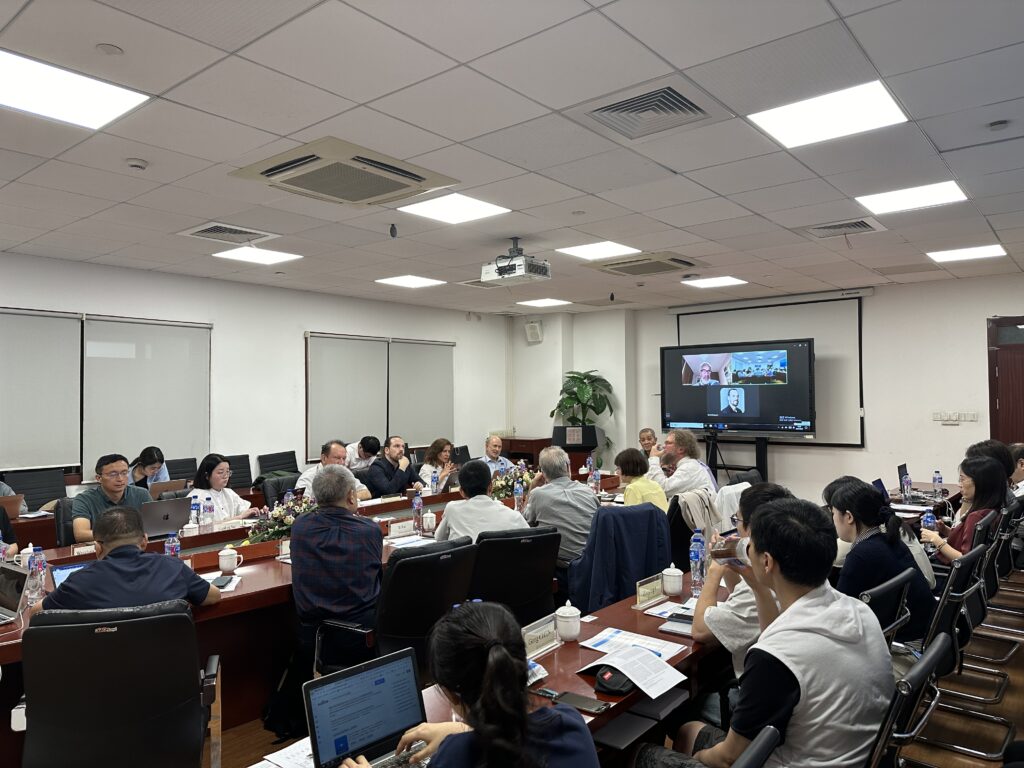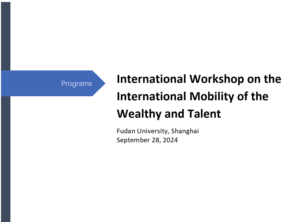Our research


On this page you will find our team's latest research and studies about Digital Nomadism
+
10
Years of research about Digital Nomadism
With digital nomadism, previously a niche phenomenon, now becoming mainstream post COVID-19, there is a “blue ocean” space to conduct innovative work and generate critical new knowledge in terms of economic, technological, and socio-cultural impacts of digital nomadism on others– this related to, specifically, strategy and policy (visa, taxation, regulation) of nation -states, nomadic organisational forms and work-from-anywhere policies of organisations, and the transformation of local communities visited by nomads worldwide. The goal is to provide comprehensive insights that will aid in creating an innovative, sustainable inclusive future of (digital -nomadic) work. The Australian -led, globally recognised team’s strong track record in collaborative research and strategic partnerships provides the foundation for generating impactful policy frameworks and new knowledge in this area, where it is sorely needed but lacking.
Our Aims and Contributions
Digital nomadism, a rapidly growing lifestyle of remote work and global travel, represents a paradigm shift in our understanding of how work is organised. The CIs’ successful previous, ARC -supported (e.g., DP19), research coined the term ‘digital nomadism’, now widely used, and largely created this research space. While much prior research, including that of the project team, has focused on the nomads themselves, this project is the first to focus on stakeholder impacts. There are increasing concerns about brain drain and tax revenue losses for developed high-cost countries. Yet, digital nomadism also presents significant opportunities for countries with visitor economies and tourist appeal. Australia falls into both categories, and digital nomadism is expected to make a substantial impact on Australia over the coming decades. COVID-19 has dramatically accelerated the digital-remote work trend, adding urgency to generate such knowledge now. The CIs have established contacts in Australia and internationally, including with governments (Australia, Estonia, Thailand), leading organisations (e.g., Atlassian, GiantSwarm), and local communities (e.g., Mallacoota, Canggu, Chiang Mai) that are immediately interested in the knowledge the project will produce and are available as partners, data sources, and/or case studies.
Research Benefits
It impacts the development of digital nomadism as a research area
It involves the novel practice of digital nomadism in practice.
It utilises an innovative technological/methodological design.
Researchers communicate findings in innovative ways.
Featured Research Articles

‘Emancipation’ in Digital Nomadism vs in the Nation‑State: A Comparative Analysis of Idealtypes
Journal of Business Ethics
Abstract: Academic and public debate is continuing about whether digital nomadism, a new Internet-enabled phenomenon in which digital workers adopt a neo-nomadic global lifestyle, represents ‘real’ emancipation for knowledge workers—or if it is, instead, the opposite. Based on a feld study of digital nomadism, and accepting a pluralist approach to emancipation, we analyse the ‘emancipatory project(s)’ that digital nomads engage in. This analysis, following Weberian idealtypes, employs a tripartite structure: unsatisfactory conditions (what people want to overcome); emancipatory means (actions taken); and emancipatory ends (desired outcomes). We critically compare digital nomadism to the traditional descriptions of emancipa-tory projects in nation-state contexts, as found in prior literature, using the same analytical framework. Juxtaposing these idealtypes, we discuss similarities and diferences and analyse their inherent assumptions, logics and ethical stances. We con-clude that digital nomadism generates an emancipation that is very much ‘real’ for digital nomads, whose experience cannot be disregarded, but with a ‘postmodern’ ethos that is at odds with modernity and its ethos originating from the Enlightenment.
Keywords: Digital work · Digital nomadism · Future of work · Emancipation · Emancipatory projects · Ethics · Critical theory · Idealtypes · Post-nation-state · Field study · Qualitative research

Digital Nomadism as a New Part of the Visitor Economy: The Case of the ‘Digital Nomad Capital’ Chiang Mai, Thailand
Information Systems Journal
Abstract: Digital nomadism allows individuals to travel worldwide while using various forms of information technology (IT) to work digitally. Places like Chiang Mai, Thailand, and Canggu, Bali/Indonesia, have gained popularity among digital nomads in the past decade. In contributing to the economies of local communities, these nomads, with their unique characteristics, are an interesting, new visitor type. Governments worldwide are starting to recognise the potential of digital nomadism to improve local visitor economies. However, the impacts of digital nomadism on local communities, their culture and economies, are not without challenges and require further understanding. Almost all existing studies on digital nomadism focus on the nomads themselves, while, in this study, we take the perspective of the locals visited by digital nomads. Using the case study of Chiang Mai, the “digital nomad capital”, we answer the following research questions: What are the impacts of digital nomadism on local communities? How do digital nomads compare to other visitor types within the visitor economy of a local community? Our findings reveal diverse socio-cultural, economic and technological impacts and how locals in Chiang Mai evaluate digital nomads differently compared to other types of visitors. This research, grounded in an in-depth case study, contributes to a better understanding of digital nomadism by offering new knowledge about its ambivalent impacts on local communities. We also discuss contributions to the wider literature and implications for policy.

Performing Identities in Unsettled Digital Work: The Becoming of ‘Digital Nomads’
Journal of Information Technology
Abstract: The advent of ‘digital ‘ways of working and organising is unequivocally transforming the very fabric of work, leading to an increasingly uncertain, unsettled, and fluid environment. Research has traditionally anchored worker identity in fixed and place-bound concepts. However, in the digital workplace, where work is more akin to a performance, unfolding over time, and processual in nature, our understanding of work and theories of worker identity are called into question. In this paper, we ask the question: how is digital worker identity performed in such fluid and unsettled work settings? To explain digital worker identity performance, we investigate digital nomadism as an extremely fluid and unsettled case of digital work. We study digital nomads, high-skilled professionals who use digital technologies to work remotely and lead a nomadic lifestyle, in a multi-sited ethnographic field study. Based on a process-relational perspective, we are theorising how the identity of digital nomads, their “becoming, “is performed as an ongoing process along lines of identity performance. This is an intermediate “product of theorising, ” in accord with the aim of the special issue, but provides a foundation for a novel process-relational theory of identity performance in unsettled digital work.

Beyond the Factory Paradigm: Digital Nomadism and the Digital Future(s) of Knowledge Work Post-COVID-19
Journal of the Association for Information Systems 21(6)
Abstract: What are the potential futures of knowledge work, given its transformation into almost exclusively digital work during the COVID-19 pandemic crisis? Our ongoing research program on digital nomadism informs a Hegelian dialectical analysis and an envisioning of the future(s) of knowledge work. We contrast the Factory paradigm of work (thesis), exemplified by the “ideal type” of the 9- to-5 corporate worker, with the Hypermobility paradigm of work (antithesis), exemplified by the ideal type of the digital nomad. Reflecting on this contrast, we envision the possible digital futures of knowledge work as a continuous spectrum, ranging from a future based on the Digital Taylorism paradigm of work to a future based on the Worker Autonomy paradigm of work.
These futures are discussed in terms of different approaches to organizing work, working with technology, delineating work/life boundaries, and provisioning the social safety net. IS researchers are uniquely positioned to perform research and inform decision-making in all these areas, and thus make a difference in determining whether the future we end up with more closely resembles Digital Taylorism or the Worker Autonomy vision.

Critical-Theoretic Review and Research Agenda on Digital Nomadism
Conference: International Conference on Information Systems (2024)
Abstract: The emerging phenomenon of digital nomadism is attracting significant interest and scrutiny in public and scholarly discourse, provoking fundamental questions about normative concerns. Engaging with such questions, we conduct a literature review on digital nomadism informed by critical-theoretic IS research. We read and analyze the literature on digital nomadism from the critical-theoretic perspectives of empowerment and emancipation, exploitation and marginalization, systems and structures, agency and technology, environment and sustainability, and ethics and ethos. On this basis, we infer 16 knowledge claims that the reviewed literature makes about digital nomadism, and propose 12 future research questions for critical-theoretic IS research on digital nomadism.

Intentions and Triggers: Why People Become Digital Nomads
Conference: Australasian Conference on Information Systems (2024)
Abstract: The emergence of digital nomadism reflects a significant shift in perceptions of and approaches to work, blending professional responsibilities with personal desires. This study investigates the underlying factors that motivate individuals to adopt a digital nomadic lifestyle, evaluating the role of psychological and situational triggers. Grounded in approach-avoidance theory, we propose a model that examines how travel intentions, job dissatisfaction and life events influence the decision to become a digital nomad. Through a 2×2 between-subject experiment, we will assess how these factors affect the likelihood of choosing a nomadic lifestyle over traditional employment. Our findings will contribute quantitative insights into the complex decision-making process driving digital nomadism and enrich the growing research area.

Digital Nomadism: Nation-States, Organization and Local Communities – From the Chinese Perspective
Fudan University, International Workshop on Mobility, October 2024


Digital Nomadism: Nation-States, Organization and Local Communities
St. Gallen University, September 2024

Assessing the Impacts of Digital Nomadism on Local Communities: The Case of Chiang Mai, Thailand
Conference: Pacific Asia Conference on Information Systems (PACIS)
Abstract: Digital nomadism is a lifestyle that enables individuals to work while travelling by using digital information technologies (IT). Locations such as Chiang Mai, Thailand and Canggu, Bali/Indonesia, are popular destinations for digital nomads. Media articles and research studies indicate significant growth in digital nomadism. Governments worldwide are developing an interest in digital nomadism. Yet, the impacts of digital nomadism on local communities are not understood well. Here, using a case study of Chiang Mai, Thailand, we focus on answering the research question, “how does digital nomadism impact local communities?”. Our preliminary findings reveal diverse economic, socio-cultural as well as digital-and built-environmental impacts. The research contributes to knowledge about digital nomadism in general and helps local communities and governments in their decision making.

Creating Meaningful Research Programs Instead of 'Chasing After Papers'
In book: “Real impact”: Challenges and opportunities in bridging the gap between research and practice – Making a difference in industry, policy, and society
Abstract: In line with the mission statements of many academic societies and universities, I view the ultimate purpose of academic research, which, unlike corporate R&D, is often publicly funded, as contributing to knowledge that benefits society at large. As such, there is, in my view, an inherent ethical obligation for research to contribute to practice, policy, and stakeholders outside academia, regardless of the prevailing academic game du jour. Over the past decades, we seem to have gone a bit too far down the path of rankings, ratings, and local KPIs-what you might call the “internal game” of modern academia (for reasons and effects beyond what I can fully outline here). It is sufficient to say there has recently been an increased recognition that academic research must emphasize more than just rankings and KPIs and (return to) engagement with external, real-life stakeholders to provide more “societal impact”, the topic of this editorial. Here, I will, as briefly as possible, a) Define what “societal impact” means, b) Discuss how societal impact can be supported, both in design and writing, in a research paper as part of a research program, c) Describe what researchers can do, measure, and track regarding impact beyond papers, and d) Provide a brief illustrative example from my own research.
© Copyright Dr Daniel Schlagwein 2024
